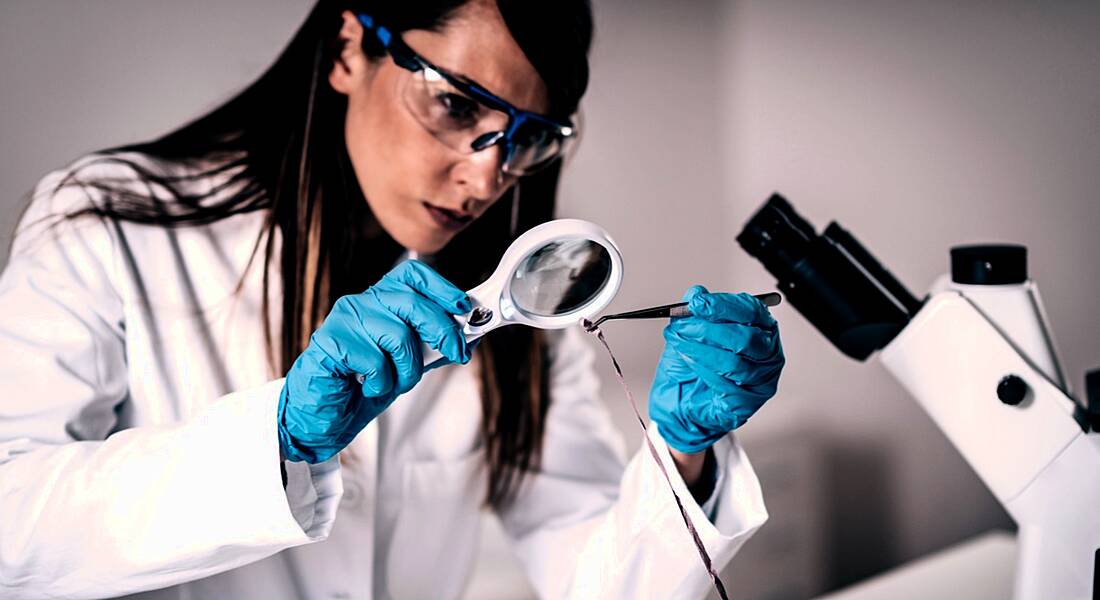Ever wanted to be part of the crime-fighting team on CSI? Forensic science is the real-life job behind analysing physical evidence.
Forensic science could certainly be considered one of the more glamourous careers in science.
With hit TV shows such as CSI, Criminal Minds and Bones, it’s no wonder that the thoughts of using your scientific prowess to solve crimes and catch murderers is appealing to many.
While a lot of the drama is best left to the television producers, working as a forensic scientist is a very real and exciting job.
For those who haven’t merely been swept up in the magic of TV, a career as a forensic scientist can be an extremely rewarding one, and there are multiple avenues you can go down.
So, what steps do you need to take towards this exciting career?
Nurture a curious mind
A forensic scientist needs to be naturally inquisitive.
“Someone with enquiring mind, who wonders how things fit together or how things work in the everyday world around them would be well suited to forensic science,” said Aodhmar Cadogan, lecturer in forensic science at IT Sligo.
As a forensic scientist, you will need to be curious enough to find details in evidence that are not always obvious. You must have a natural desire to discover everything there is to discover about a piece of evidence.
Develop your analytical skills
Once your curiosity has helped you discover all the facts, you will need to be able to analyse those facts. As a forensic scientist, your analytical skills must be second to none.
“In forensic science, we rely on collecting and analysing data from scientific experiments to try and come to a final opinion and interpretation of the facts from a crime scene,” said Cadogan.
“That opinion is highly valued by the court to help the judge and jury decided the innocence or guilt of someone on trial.”
She also said that a forensic scientist must have great attention to detail to ensure that their opinion is based on a true interpretation of the facts.
Obtain a degree in science
Once you have established that you have the natural abilities and personality traits to be a forensic scientist, it’s time to get your qualification.
Cadogan said a general science degree is a good way to start, usually in chemistry or biology. However, your education is unlikely to end there. “Most forensic scientists would also have a postgraduate qualification in forensic science,” she said.
“They may have done further study in a forensic-related subject, eg genetics, advanced analytical methods [etc].”
Gain experience
Once fully qualified, a budding forensic scientist will want to seek out work experience. “Forensic science by definition is where the science meets the law,” said Cadogan. Therefore, there are many places to look for experience outside the mainstream forensic science lab.
“You also have to think about areas such as the state laboratory or the public analyst laboratory, which carry out many of the statutory testing on foodstuffs, feedstuffs and beverages, or the Environmental Protection Agency, who test our waters and soil.”
Speaking about graduates from the forensic investigation and analysis programmes at IT Sligo, Cadogan said they have gone on to a wide range of careers, including within healthcare, pharma and the State lab.
“In addition, some of our graduates have joined An Garda Síochana,” she said.
Stay clued in
Finally, a budding forensic scientist must stay abreast of the latest trends and advancements within the forensics sector.
“It is a very exciting time to be in forensic science, as the field is constantly evolving,” said Cadogan. “The science is always trying to keep up with the crime and the criminals, and vice versa.
“So, for example, the illegal psychoactive substances that are found in Europe are constantly changing, the limits of DNA technology are such now that a person can be identified from a very tiny amount of DNA, and the instrumentation that we use in the laboratories and the controls that need to be in place are always changing and improving.”




